

Area Reviews Chris Dearnley Area Review Lead - Kent
Area Reviews - Purpose • An offer that meets local learner and employer need and provides access to high quality and relevant education and training for all • The right balance of provision, including greater specialisation and higher level technical skills. • Supporting economic development • Create sustainable institutions
Context • Declining financial health since 2010 – more colleges in difficulty, big cost variations • Challenges for next 5 years: devolution; apprenticeships; funding reform; competition; demographic decline • A refocus of the GFE sector on technical education and training to meet local and national economic needs, with a need for higher-level skills, greater specialisation, and increased local coordination • Over time, provision should become focused on the 15 new technical education routes, as detailed in the Post-16 Skills Plan • Whilst spending review better than expected for post-16, status quo is not an option – need for fundamental reform
Prioritisation of Area Reviews Triggers: • Falling demographics/oversupply • Declining financial picture • Quality • Colleges in intervention • Requests from LEPs, LAs, Colleges • Devolution bids
The Programme • Approximately 37 area reviews to be completed by March 2017 • With full implementation by 2020 • Covering all areas of the country • Incorporating GFEs and sixth form colleges • Taking account of school sixth forms and other provision • And including other providers where they seek to opt in and steering group agrees
Defining the Area Determine what makes sense based on: • LEP area boundaries • Local authority boundaries • College travel to learn patterns • Inter-college working Timing: • 40 area reviews • 5 Waves – September 2015 – March 2017
The Process Analysis throughout, which will consider the local area's current and future education and economic needs, and the current education and training provision and performance: • Supply and demand and travel to learn analysis • Economic data, demographics, deprivation etc. • College visits • Curriculum review • Estates review • Review potential for savings (including back office services / rationalisation of curriculum or estates • Assess financial sustainability of options
The Process • Series of steering group meetings • Engagement with stakeholders, partners, unions, students • Development and evaluation of options for provision and institutional change where needed • Evidence-based report with recommendations • Institutions take decisions on changes, and announcements are made. • After the area review, institutions will be expected to consult on proposed changes before taking forward implementation • EFA & SFA will support implementation.
Stakeholder Engagement Views welcome on – strengths of post 16 provision in the area and how these can be build upon – weaknesses of post 16 provision in the area and how these can be addressed – progression routes (academic and professional) and how these can be improved – Breath and quality of provision – Collaboration – Specialisation – Involvement and responsiveness – Meeting needs and skills development – Barriers/access to education – Sustainability
Outcomes • There are no preconceptions as to preferred solutions • The recommendations must work for the area and be able to be implemented within a reasonable timeframe • The outcomes must be affordable and lead to a sustainable sector
Stages in process • Colleges submit information • Site visits by advisers • SG1 Dec 2016 • Jan – DFEC & Lead meet with colleges • 3 Feb SG3 • 9 Mar SG4 • 30 March SG5
Overview – Providers In Scope Providers in Scope 1 Canterbury College 2 East Kent College 3 Hadlow College 4 Mid-Kent College 5 North Kent College 6 West Kent and Ashford College Kent County Council provision elected to be included in review For details on the data definitions, please see the appendix.
Post-16 Schools Provision Local Authority No. of School Sixth No. of Students Forms 2015/16 Kent County 110 20,788 Council Medway Council 21 3,776 Total 131 24,564 • Plus private & charitable providers
Local Context: Young Residents • 16-18 population falling by 7% from 2015 to 2020 then - increasing by 22% between 2019 and 2030 90,000 80,000 70,000 60,000 50,000 Kent 40,000 Medway Grand Total 30,000 20,000 10,000 -
Future Skills Needs: Sector Headlines Highest Vacancies (Job title) Sales Executive, Registered Nurse Teacher’s Assistant, Quantity Surveyor, Assistant Manager, Primary School Teacher, Business Development Executive, Auxiliary Nurse, Account Manager Receptionist,
Changes needed: • increase in advanced and higher-level skills inc apprenticeships • CIAG increased awareness & understanding of growth sectors • innovative approaches to delivery • sector specialisms • collaborative approach to identify appropriate pathway
Further Information Area Review Guidance https://www.gov.uk/government/publications/post-16- education-and-training-institutions-area-based-reviews Responses to - Area Review Mailbox - area.reviews@education.gsi.gov.uk Please mark ‘ Kent Area Review ’ Chris Dearnley 07767 847440 Chris.dearnley@sfa.bis.gov.uk
Recommend
More recommend